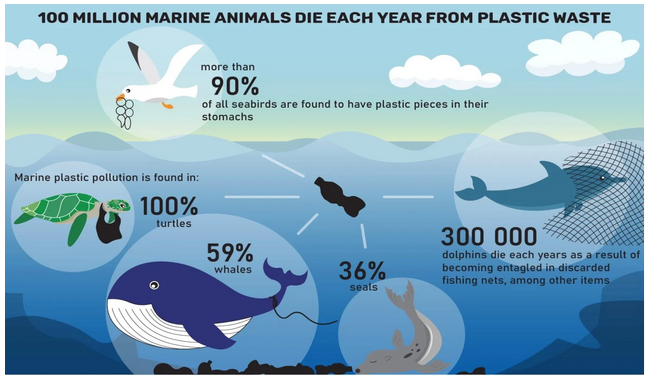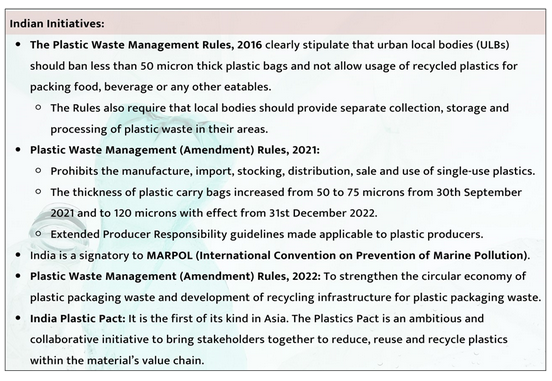GS Paper III
News Excerpt:
Recently, the third session of the Intergovernmental Negotiating Committee is going to be scheduled at the UN Environment Programme (UNEP) Headquarters in Nairobi, Kenya.
UNEP-3RD SESSION
- The session is scheduled to take place from 13 to 19 November 2023.
- The goal of the 3rd session of UNEP is to develop a United Nations Treaty on Plastic Pollution – an international legally binding instrument on plastic pollution, including in the marine environment.
- At this session, an international group of scientists cautioned against relying on plastic removal technologies and instead, they urged that we must focus on prevention, not symptom management to address the plastic pollution crisis.
What is Plastic pollution?
- The accumulation of plastic objects and particles in the Earth's environment adversely affects humans, wildlife and their habitat.
How does plastic affect marine species?
- It is estimated that marine plastics are contributing to the death of more than 100,000 marine mammals every year.
- Plastic can affect marine species in a variety of ways, from entanglement and injury to ingestion and toxic contamination.

What impact is plastic having on the ocean?
- The ocean is perhaps the most vulnerable environment to plastic waste.
- Once plastic enters the sea, it has no boundaries – waves and storms can carry plastics to even the furthest reaches of the ocean.
- They accumulate into large gyres on the high seas or become embedded in shorelines and delicate coastal ecosystems.
- They’ve even been found on uninhabited islands.
- After some months or years at sea, plastic breaks down into smaller and smaller pieces, battered by waves and storms, eventually to sizes smaller than a grain of sand. This makes retrieving plastics from the ocean extremely difficult – almost impossible.
OECD Report
- According to a new OECD Report: The amount of plastic waste produced globally is on track to almost triple by 2060, with around half ending up in landfills and less than a fifth recycled.
- This report outlines the prerequisites needed to curb plastic pollution.
- The new report builds on the OECD’s first Global Plastics Outlook: Economic Drivers, Environmental Impacts and Policy Options, released in February 2022.
- The first report found that plastic waste has doubled in two decades, with most ending up in landfills, incinerated or leaking into the environment.
- Since that report's release, UN member states have pledged to negotiate a legally binding international agreement by 2024 to end plastic pollution.
FOCUS ON PREVENTION, NOT SYMPTOM MANAGEMENT:
- One group of scientists is urging that it is much more effective to curb demand for plastics rather than have to deal with the problems they create.
- The discussions regarding the UN Treaty on Plastic Pollution should focus on lowering the dependence and production of virgin plastic materials, particularly from fossil fuels, and towards zero waste.
- If the discussions instead focus on creating plastic offset schemes based on plastic removal technologies to offset waste and emissions, the treaty will not be effective at slowing this global crisis
- They caution that the overall impact of plastic removal technologies on the ocean may potentially be more harmful than helpful.
- So far, we lack hard evidence on the net benefits of plastic removal technologies. On the contrary, there is often bycatch mortality (bycatch refers to “discarded catch of marine species and unobserved mortality due to a direct encounter with fishing vessels and gear, these unintentionally caught animals often suffer injuries or die) associated with these technologies, which becomes a problem if scaled up.
What’s needed?
- We have to scrutinise these technologies by applying science-based criteria to prevent regrettable outcomes.
- We need ecologically safe and sound solutions, and we need them upstream. Once plastic is in the environment, it’s hard to remove without doing more damage.
Global Plastics Outlook: Policy Scenarios to 2060:
- It looks at the impact of two potential scenarios.
- The first, a regional action scenario comprising a mix of fiscal and regulatory policies primarily in OECD countries could decrease plastic waste by almost a fifth and more than halve plastic leakage into the environment without a substantial impact on global GDP, which would be lower by 0.3% by 2060.
- The second, a global action scenario comprising more stringent policies implemented worldwide, could decrease plastic waste by a third and almost completely eliminate plastic leakage to the environment while lowering global GDP by an estimated 0.8%.
- The report also looks at how actions to reduce greenhouse emissions could reduce plastic pollution given the interplay between the plastics lifecycle, fossil fuels and climate change.
Ways to curb Plastic pollution suggested by OECD Report:
Policies to reduce the environmental impacts of plastics and encourage a more circular use of them should include:
- Taxes on plastics, including on plastic packaging
- Incentives to reuse and repair plastic items
- Targets for recycled content in new plastic products
- Extended producer responsibility (EPR) schemes
- Improved waste management infrastructure
- Increased litter collection rates.
Way Forward:
GOVERNMENT OF INDIA INITIATIVES:

Global Initiatives:
- The Global Tourism Plastics initiative aims to reduce plastic pollution from the tourism sector through a set of actionable commitments by 2025.
- UN Treaty on Plastic Pollution.
- One Plastics Initiative by UNEP.
Mains PYQ
Q. What are the consequences of spreading ‘Dead Zones’ on marine ecosystems? (UPSC 2018)


